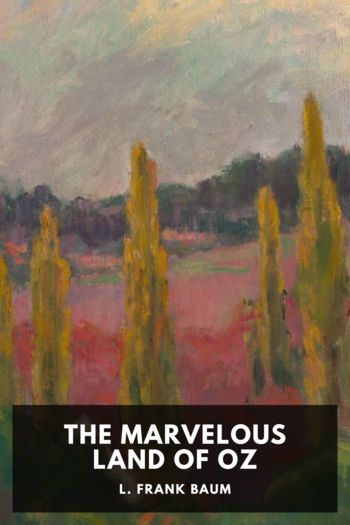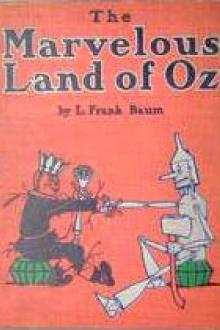The Story of Mary MacLane - Mary MacLane (great reads .txt) 📗

- Author: Mary MacLane
- Performer: -
Book online «The Story of Mary MacLane - Mary MacLane (great reads .txt) 📗». Author Mary MacLane
I was conscious of an intense humor that was so far beyond laughter that it was too deep even for tears. But I felt tears vaguely as I watched the peddler-woman limping up the road.
It was not pathos. It was humor—humor. My emotion was one of vivid pleasure—pleasure at the sight of the woman, and at the telescope valise, and at her conversation supplemented by my own.
This emotion is divine and I can not grasp it.
As I looked after the Italian peddler-woman it came to me with sudden force that the earth is only the earth, but that it is touched here and there brilliantly with divine fingers.
Long and often as I’ve sat in intense silent passion and gazed at the red, red sunset sky I have never felt this sense of the divine.
It comes only through humor.
It comes only with things like an Italian peddler-woman in a black satine wrapper and an ancient cape.
My soul—how heavily it goes.
Life is a journeying up a spring-time hill. And at the top we wonder why we are there. Have mercy on me, I implore in a dull idea that the journey is so long—so long, and a human being is less than an atom.
The solid heavy figure of an Italian peddler-woman with a telescope valise, limping away in the afternoon sunshine, is more convincing of the Things that Are than would be the sound of the wailing of legions of lost souls, could it be heard.
- For the world must be amused. -
And the world’s wind bloweth as it listeth.
*
April 11
I write a great many letters to the dear anemone lady. I send some of them to her and others I keep to read myself. I like to read letters that I have written—particularly that I have written to her.
This is a letter that I wrote two days ago to my one friend:
*
_
To you: -
And don’t you know, my dearest, my friendship with you contains other things. It contains infatuation, and worship, and bewitchment, and idolatry, and a tiny altar in my soul-chamber whereon is burning sweet incense in a little dish of blue and gold.
Yes, all of these.
My life is made up of many outpourings. All the outpourings have one point of coming-together. You are the point of coming-together. There is no other.
You are the anemone lady.
You are the one whom I may love.
To think that the world contains one beautiful human being for me to love!
It is wonderful.
My life is longing for the sight of you. My senses are aching for lack of an anemone to diffuse itself among them.
A year ago when you were in the High School often I used to go over there when you would be going home, so that my life could be made momentarily replete by the sight of you. You didn’t know I was there—only a few times when I spoke to you.
And now it is that I remember you.
Oh, my dearest,—you are the only one in the world!
We are two women. You do not love me, but I love you -
You have been wonderfully-beautifully kind to me.
You are the only one who has ever been kind to me.
There is something delirious in this—something of the nameless quantity.
It is old grief and woe to live nineteen years and to remember no person ever to have been kind. But what is it—do you think?—at the end of nineteen years, to come at last upon one who is wonderfully-beautifully kind!
Those persons who have had some one always to be kind to them can never remotely imagine how this feels.
Sometimes in these spring days when I walk miles down into the country to the little wet gulch of the sweet-flags, I wonder why it is that this thing does not make me happy. “She is wonderfully-beautifully kind,” I say to myself—“and she is the anemone lady. She is wondrously kind and though she’s gone, nothing can ever change that.”
But I am not happy.
Oh, my one friend—what is the matter with me? What is this feeling? Why am I not happy?
But how can you know?
You are beautiful.
I am a small vile creature.
Always I awake to this fact when I think of the anemone lady.
I am not good.
But you are kind to me—you are kind to me—you are kind to me.
You have written me two letters.
The anemone lady came down from her high places and wrote me two letters.
It is said that God is somewhere. It may be so.
But God has never come down from his high places to write me two letters.
Dear,—do you see, you are the only one in the world.
Mary MacLane_
April 12
Oh, the dreariness, the Nothingness!
Day after day—week after week,—it is dull and gray and weary. It is dull, DULL, DULL!
No one loves me the least in the world.
“My life is dreary—he cometh not.”
I am unhappy—unhappy.
It rains. The blue sky is weeping. But it is not weeping because I am unhappy.
I hate the blue sky, and the rain, and the wet ground, and everything. This morning I walked far away over the sand and these things made me think they loved me—and that I loved them. But they fooled me. Everything fools me. I am a fool.
No one loves me. There are people here. But no one loves me—no one understands—no one cares.
It is I and the barrenness. It is I—young and all alone.
Pitiful Heaven!—but no, heaven is not pitiful.
Heaven also has fooled me, more than once.
There is something for every one that I have ever known—some tender thing. But what is there for me? What have I to remember out of the long years?
The blue sky is weeping, but not for me. The rain is persistent and heavy as damnation. It falls on my mind and maddens my mind. It falls on my soul and hurts my soul.—Everything hurts my soul.—It falls on my heart and it warps the wood in my heart.
Of womankind and nineteen years, a philosopher of the peripatetic school, a thief, a genius, a liar, and a fool—and unhappy, and filled with anguish and hopeless despair. What is my life? Oh, what is there for me!
There has always been Nothing. There will always be Nothing.
There was a miserable, damnable, wretched lonely childhood. Itself has passed, but the pain of it has not passed. The pain of it is with me and is added to the pain of now. It is pain that never lets itself be forgotten. The pain of the childhood was the pain of Nothing. The pain of now is the pain of Nothing. Oh, the pathetic burlesque-tragedy of Nothing!
It is burlesque but it is none the less tragedy. It is tragedy that eats its way inward.
It is only I and the sand and barrenness.
I have never a tender thing in my life. The sand and barrenness has never a grass-blade.
I want a human being to love me. I have need of it. I am starving to death for lack of it.
Bitterest salt tears surge upward—sobs are shaking themselves out from the depths. Oh, the salt is bitter. I might lay me down and weep all day and all night—and the salt would grow more bitter and more bitter.
But life in its Nothingness is more bitter still.
It is burlesque-tragedy that is the most tragic of all.
It is an inward dying that never ends. It is the bitterness of death added to the bitterness of life.
What hell is there like that of one weak little human being placed on the earth—and left alone?
There are people who live and enjoy. But my soul and I—we find life too bitter, and too heavy to carry alone. Too bitter, and too heavy.
Oh, that I and my soul might perish at this moment, forever!
*
April 13
I am sitting writing out on my sand and barrenness. The sky is pale and faded now in the west, but a few minutes ago there was the same old-time always-new miracle of roses and gold, and glints and gleams of silver and green, and a river in vermilions and purples—and lastly the dear, the beautiful: the red, red line.
There also are heavy black shadows.
I have given my heart into the keeping of this.
And still as always I look at it—and feel it all with thrilling passion—and await the Devil’s coming.
��
��
*
L’Envoi
*
October 28, 1901
And so there you have my Portrayal. It is the record of three months of Nothingness. Those three months are very like the three months that preceded them, to be sure, and the three that followed them—and like all the months that have come and gone with me, since time was. There is never anything different; nothing ever happens.
Now I will send my Portrayal into the wise wide world. It may stop short at the publisher; or it may fall still-born from the press; or it may go farther indeed and be its own undoing.
That’s as may be.
I will send it.
What else is there for me, if not this book?
And, oh, that some one may understand it!
- I am not good. I am not virtuous. I am not sympathetic. I am not generous. I am merely and above all a creature of intense passionate feeling. I feel—everything. It is my genius. It burns me like fire. -
My portrayal in its analysis and egotism and bitterness will surely be of interest to some. Whether to that one alone who may understand it; or to some who have themselves been left alone; or to those three whom I, on three dreary days, asked for bread, and who each gave me a stone—and whom I do not forgive (for that is the bitterest thing of all): it may be to all of these.
But none of them, nor any one, can know the feeling made of relief and pain and despair that comes over me at the thought of sending all this to the wise wide world. It is bits of my wooden heart broken off and given away. It is strings of amber beads taken from the fair neck of my soul. It is shining little gold coins from out of my mind’s red leather purse. It is my little old life-tragedy.
It means everything to me.
Do you see, it means everything to me.
It will amuse you. It will arouse your interest. It will stir your curiosity. Some sorts of persons will find it ridiculous. It will puzzle you.
But am I to suppose that it will also awaken compassion in cool indifferent hearts? And will the sand and barrenness look so unspeakably gray and dreary to coldly critical eyes as mine? And shall my bitter little story fall easily and comfortably upon undisturbed ears, and linger for an hour, and be forgotten?
Will the wise wide world itself give me in my outstretched hand a stone -





Comments (0)